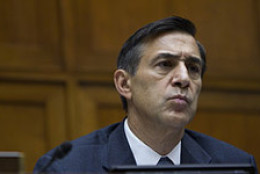Congress
-
From Darleen Druyun to Jack Abramoff to wartime contracting, history shows the Public Buildings Service's lavish spending is small potatoes. Experts say the energy and time Congress has put into hearing on the GSA conference near Las Vegas could be better used to address bigger, most costly problems.
April 19, 2012 -
Even if you never, or hardly ever, go to a Post Office there's a good chance you went there Tuesday to mail your taxes, and get an SOS from some worried postal employees, Senior Correspondent Mike Causey says.
April 19, 2012 -
General Services Administration Inspector General Brian Miller told senators on Wednesday his office had made a criminal referral to the Justice Department relating to the ongoing spending scandal. Speaking at the last of four congressional hearings about the GSA, Miller testified that he has heard from "a lot" of whistleblowers since his report was released several weeks ago.
April 18, 2012 -
The Accountability in Government Act would require agency leaders to sign off on any conference costing more than $200,000.
April 18, 2012 -
This week the Senate is expected to take up legislation to reform the Postal Service. The bill could close post offices, end Saturday deliveries and return funds the Postal Service as pre-paid for retiree health benefits. USPS already has started considering how it would operate with a slimmed-down workforce.
April 18, 2012 -
The House Committee on Homeland Security will mark up the Promoting and Enhancing Cybersecurity and Information Sharing Effectiveness Act of 2011 today. All members of the House got a snapshot of the nation's cyber threats yesterday in an interagency briefing.
April 18, 2012 -
A former General Services Administration executive created a culture of lavish spending — and fear among his employees who spoke up against him — according to testimony in a House subcommittee hearing today.
April 17, 2012 -
Sunlight Foundation Policy Counsel Daniel Schuman is leading the campaign to improve the Library of Congress website that reports congressional data.
April 16, 2012 -
Congress returns to session this week with a few short months to reach a budget resolution for the new fiscal year starting Oct. 1 and agree on how to avoid the automatic spending cuts of $1.2 trillion over the next decade that will be triggered Jan. 2, 2013, under the Budget Control Act debt limit deal. But don't expect much to get accomplished before the election, say budget experts.
April 16, 2012 -
Oversight and Government Reform Committee subpoenas Jeff Neely, PBS region 9 commissioner, to appear. Along with Neely, PBS Deputy Commissioner David Foley and former Administrator Martha Johnson are on the witness list. The Transportation and Infrastructure Committee also is expected to hear from GSA Deputy Administrator Susan Brita, CFO Alison Doone and event planner Lisa Daniels.
April 16, 2012 -
Current and former officials at the General Services Administration will face a gauntlet of congressional hearings this week, following reports of excessive spending on a 2010 regional training conference and other programs. In an interview on In Depth with Francis Rose, former Virginia Congressman and Chair of the House Oversight and Government Reform Committee Tom Davis shared his insights and what to look for during the hearings.
April 15, 2012 -
Congressman Darrell Issa (R-Calif.) has broadened the scope of Congress' probe into the GSA conference scandal, requesting a list of all overnight conferences attended by more than 50 employees at 23 federal agencies and departments.
April 13, 2012 -
Shortly after the Titanic sank 100 years ago, the Senate conducted an investigation into in the disaster. Transcripts of these hearings are available in libraries across the U.S.
April 13, 2012 -
Information sharing is critical but insufficient, White House cyber chief says. Howard Schmidt said the federal government's responsibility is broader than its own systems and that is why any cyber bill needs stronger oversight of critical networks.
April 11, 2012 -
As lawmakers gear up for the first of several congressional hearings about the spending scandal at the General Services Administration, District of Columbia delegate Eleanor Holmes Norton told In Depth with Francis Rose that the inspector general and the president have "already cured the problem."
April 09, 2012




